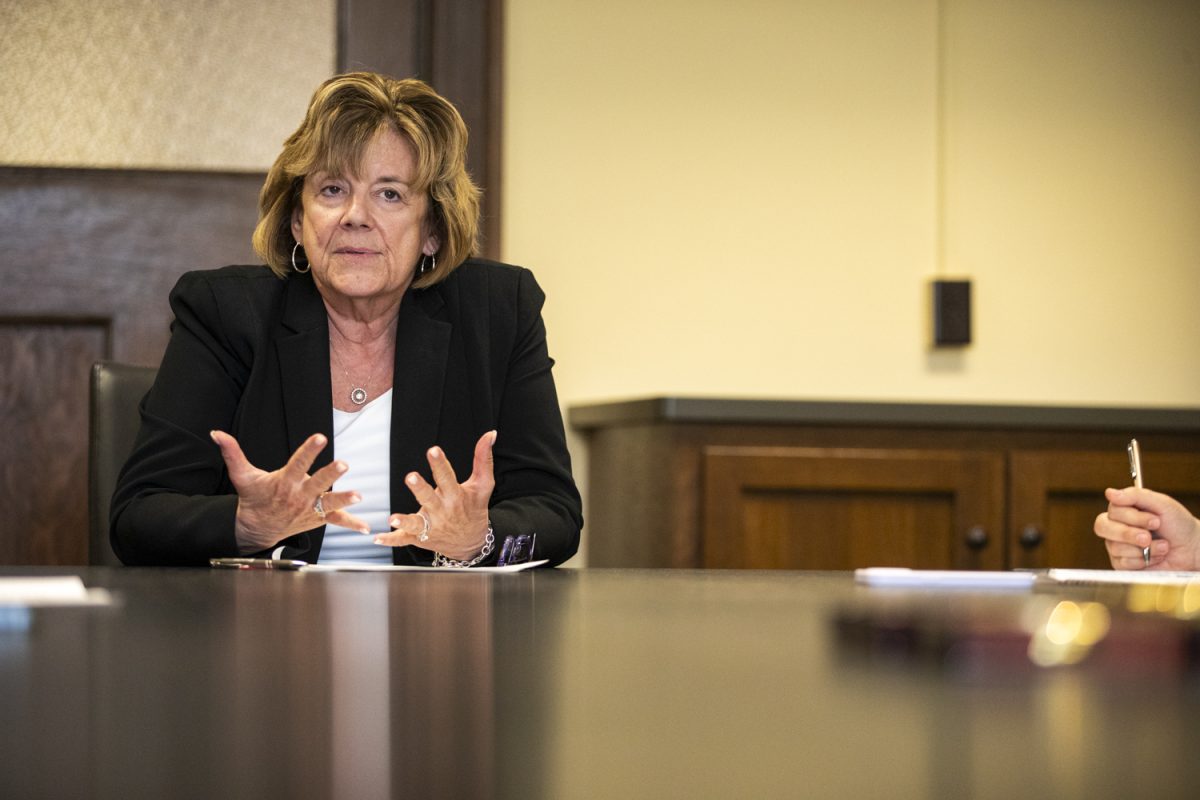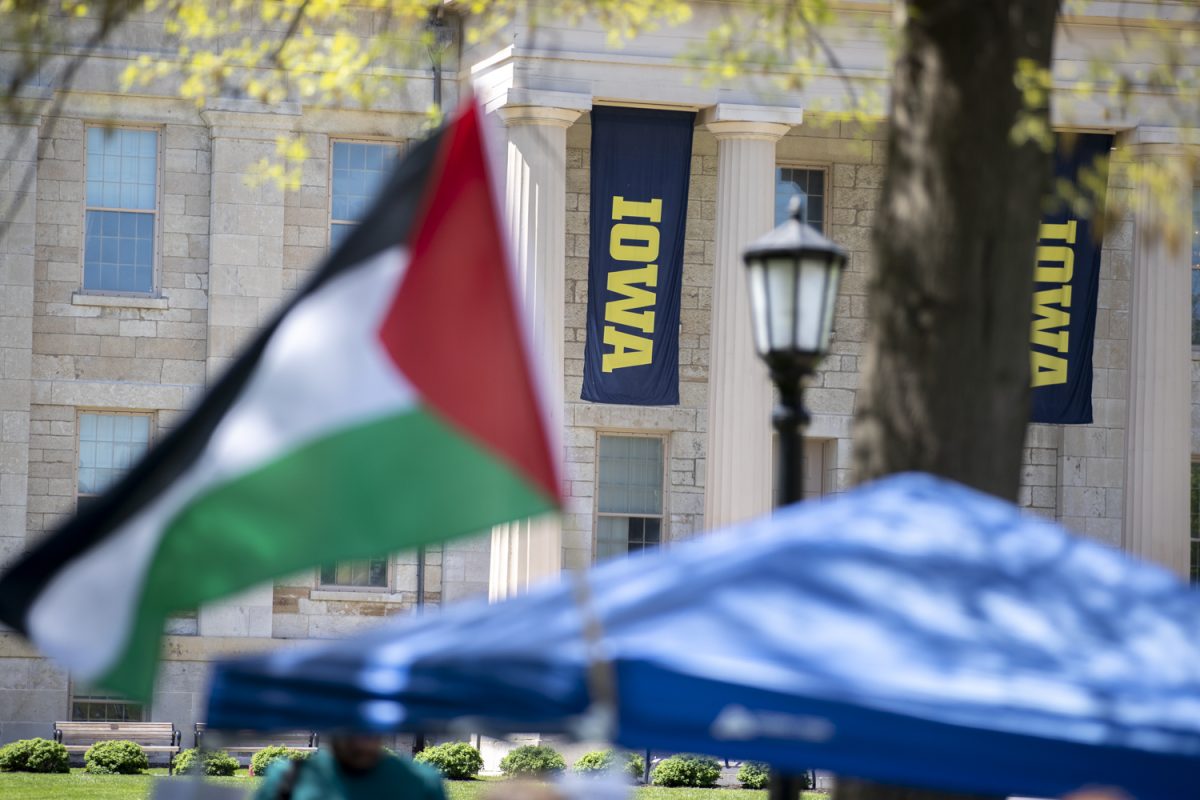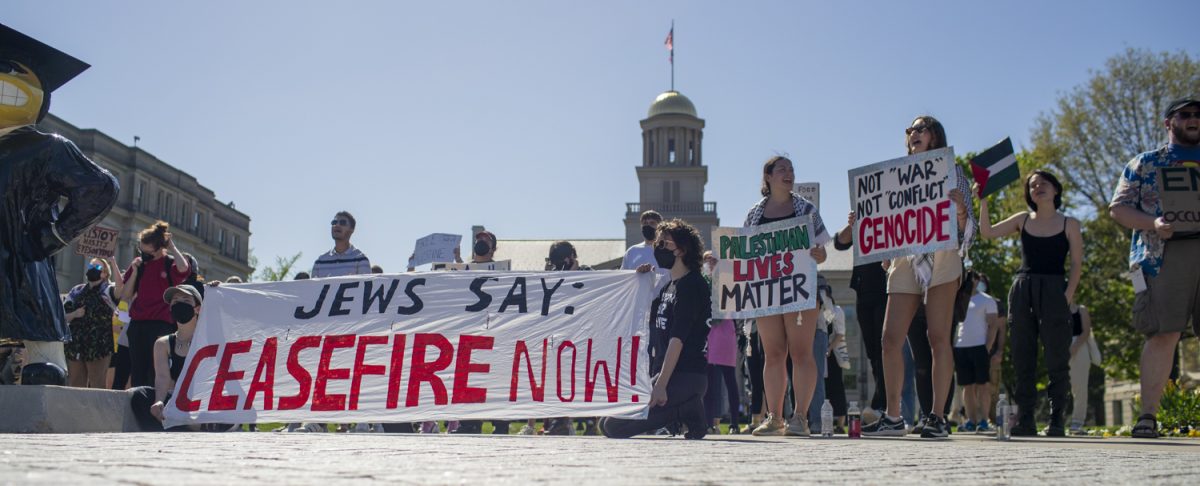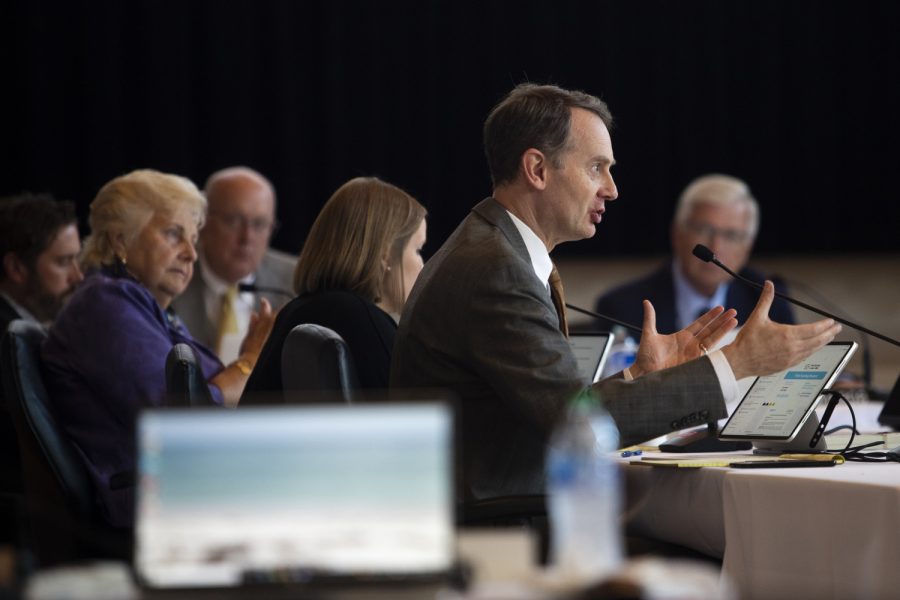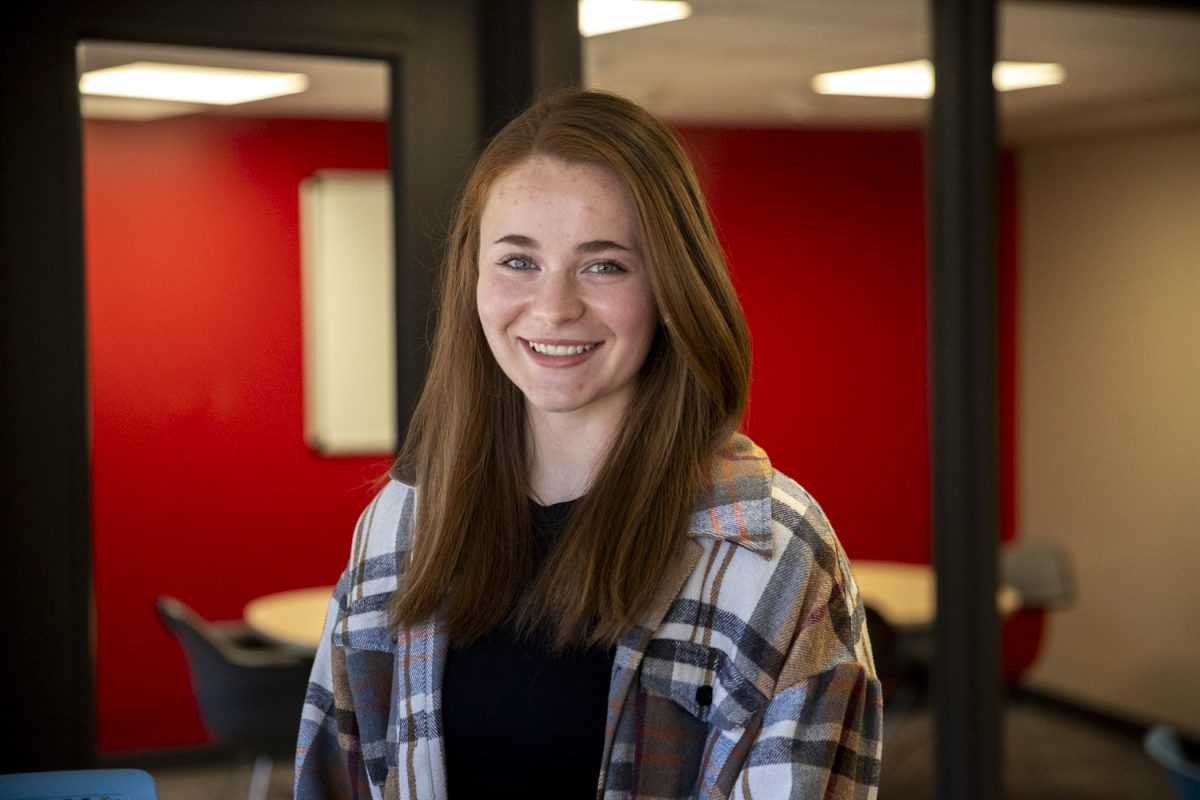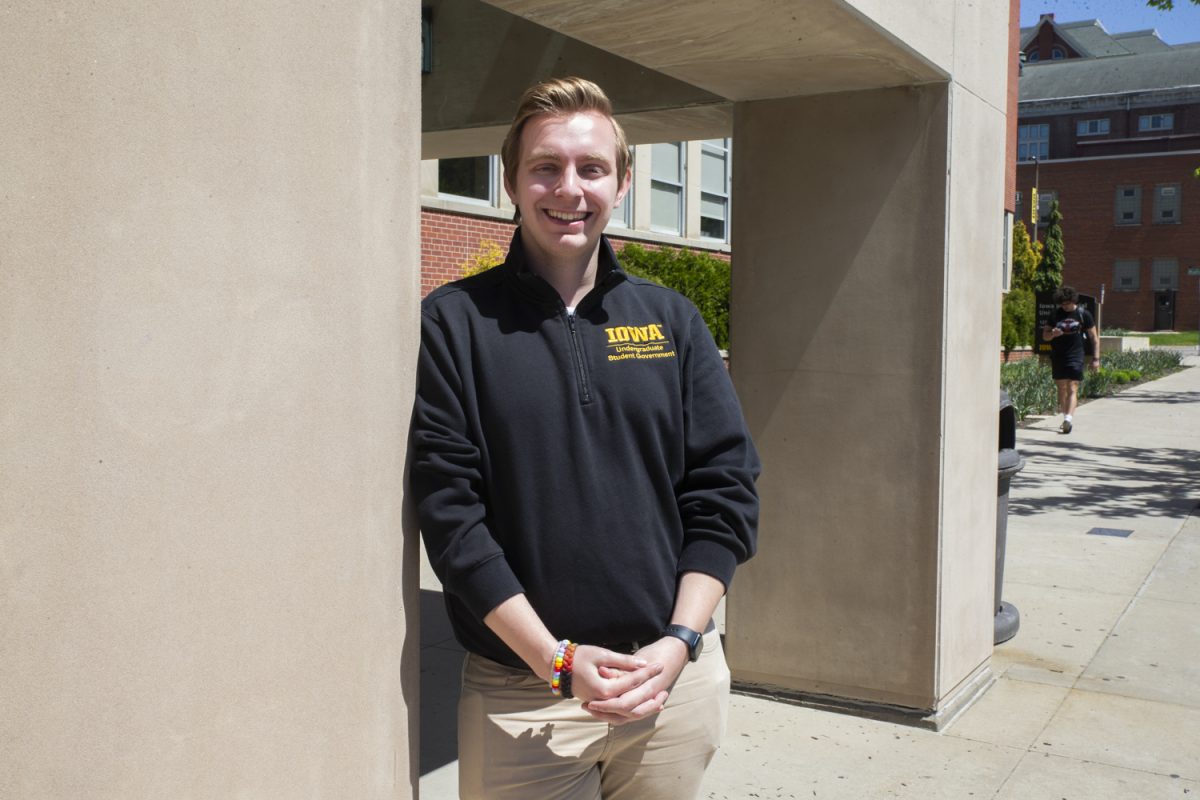The Daily Iowan interviewed University of Iowa President Barbara Wilson on Tuesday on topics ranging from changes to diversity, equity, and inclusion programming, the future of women’s basketball, protests on campus calling for a ceasefire of the Israel-Hamas war, and more.
This interview has been edited for length and clarity.
The Daily Iowan: Over the past couple of years, women’s basketball has put the University of Iowa in the national spotlight. What does the future of women’s basketball at Iowa look like?
Wilson: We’re going to miss Caitlin a lot and the other seniors, but we have some great people coming on board and some great talent that’s just getting better every year. So I’m not going to predict what next year will look like, but I think we’re set up to be a powerhouse again next year. And you know, I’d like to think about women’s sports in a bigger way. It’s not just women’s basketball. We’re the only Power Five school with a women’s wrestling team. We have this long history of supporting women’s sports here going back to Christine Grant.
We don’t usually brag about things very often, but I think we can brag about the amount of exposure and the attention that it’s given [the UI] but also the kind of way that we’ve been reflecting the values that we care about here: teamwork and women’s leadership and these incredible athletes who actually give back to their community. It just embodies so many of the values that we’re excited about, and I don’t think that’s going to change. It’s been a great year.
How have you and Beth Goetz worked with NIL organizations including The Swarm to get those lucrative transfers and further support Iowa athletes?
I don’t really work directly with The Swarm, although I’m certainly happy for their support and for their loyalty to the university. We’re trying really hard to follow all the rules and procedures around recruitment. I think right now, every conference is hopeful for some guardrails around NIL so that we’re all operating from a similar playing field, and the kinds of things that we’re offering to students can be similar across the conferences. We’re not there right now, to be honest with you, so that’s my hope for the future because I think we should not be having people violating rules around recruitment. I think it’s bigger than the University of Iowa, frankly.
What is your opinion on the pro-Palestine protests popping up on college campuses across the nation? Do you have any plans to issue police responses similar to other universities?
My feeling is that we should be a place where students can exercise their voices, and I think we’ve done a pretty good job of that at Iowa.
We’ve invited speakers from different viewpoints and backgrounds, we’ve managed to host events through our student orgs that don’t always resonate with everybody, but we’ve done it in a way that we’ve allowed people to have dialogue and discuss tricky issues. We’ve done it in a way where we’ve been safe, and we’ve managed crowd control issues, and we’ve allowed these events to go on, so that’s a good thing.
We’ve also had protests, there have been protests before, around the Gaza war on the Pentacrest and elsewhere in the community. I would like to think we’re at a place that supports students having a voice and moments and places to reflect and to express opinions. We’re not going to squelch that; that’s First Amendment rights in action.
We also have guidelines and rules about how to do those kinds of things and we are constantly helping our stakeholders and our community members know what those rules are. We’re hopeful in this case that we’ll have the same kind of peaceful protest or activity or expression of beliefs and that we keep things safe and that we protect people’s rights but also their safety.
Do you think, if protests escalated to become unsafe as you said, would you call on a police response similar to other universities?
Universities have done a lot of different things. We’re going to meet our needs the way we do, which is we’re going to rely on our public safety professionals. We’re going to be helpful and monitoring and make sure people are safe, and I think we’ve got great folks who are ready to do that and we’ve done it already. We’ve done it with speakers. There were some protesters recently, over near the Marriott, we managed that; we helped the city manage that very successfully. So that’s our plan.
What are your thoughts on the decision to transition RVAP at the UI and the pushback from students following the change?
My understanding is that the services that were there are going to continue to be offered. And the other thing that I learned is that the majority of people that are being served are not students and not even in this county. So we always have to evaluate the resources, the space, and the activities that we engage in relative to the stakeholders we serve.
We’re not going to get rid of the services, but it may be that it’ll be better in this larger, different organization that really is beyond the campus. I think it’ll be seamless. I hope it’ll be seamless. I think people have been very nervous about it. But our goal is to keep serving rape victims, survivors, and anybody who needs the help and doing it in a way that’s the most effective.
How are you working with state lawmakers, the Iowa Board of Regents, and the Attorney General’s Office to ensure compliance with new DEI provisions?
I’m pleased with where we landed in terms of the recommendations. I think they uphold the spirit of what we’re trying to do, which is to welcome people from all different backgrounds, all different viewpoints, all different walks of life to this campus and make sure they get the service and the education they need. You all, I think as students, hope that we’re helping you think about how to be leaders in a global world that’s going to be very diverse.
Employers want you to be able to solve complex problems with teams that are diverse, and so our goal is to continue to do that work and comply with our accreditation and our federal and state law requirements.
To do that we’ve come up with a plan, which I think is a pretty good plan. We’ve changed the name of the central office, or we’re in the process of doing that so that we really focus on what that office does. The word “diversity” is still in that name because that’s what we do. We serve a lot of different people from a lot of different backgrounds. And we have 30 different accrediting bodies out there, from the NCAA, to health care accrediting bodies, to journalism and mass communication accrediting bodies, to law school, and most of them.
I think 98 percent of them have explicit language in them about ensuring that we serve diverse students and that we help students with diversity and inclusion and faculty and staff and patients to patient care. We have to comply with all of that. We want to comply with all of that.
I think that what we’ve done through the directives is to manage a new path forward that’s going to be even stronger and better. We’re going to continue to work with our legislators on how to make sure they understand what the requirements are and how we think about diversity.
Following your presentation of the UI’s action on DEI directives made by the Iowa Board of Regents, ISU and UNI announced they would be shutting down parts of their DEI offices. Why did the UI take a different path?
We believe in a hub and spoke model, which means we have small central offices that help coordinate services across the campus and then spoke out, if you will, to other units. In our view, having a lean but focused central office helps make sure we don’t duplicate what we do or conflict with what we do and helps organize our activities across the campus. So for us, that model still works and it’s one that ensures that we are doing the best that we can do without duplication and without having people not doing things consistently.
It’s a model that the Board of Regents actually encouraged us to use many years ago, and we do it for a lot of things. We have a very small central HR office and then we have HR across the campus, similar to IT and a variety of other services that we have. I think this model, for us, is the best model. I can’t really comment on the other two institutions. We didn’t talk to them about what they were doing because we’re different. We’re different sizes, we’re a different scope. We have this big healthcare enterprise here that neither of the other two campuses have. We have to think about patient care and training of health care professionals, and that’s not something they have to focus on. So I wouldn’t expect that we have a model that’s similar.
Mayflower Residence Hall is staying open for the 2024-25 academic year. What does the future of Mayflower look like, and what led to the sale’s delay?
We looked at selling it. We actually put some feelers out there and had it listed for a while and we had some offers. As we looked at what was being offered and what our future looks like, we decided we should regroup and really rethink Mayflower, and this is what universities do. They are constantly learning and changing our approach when it makes sense.
I think what we’re realizing is that the demand for an Iowa education is strong and increasing. Just for an example, our applications were up 10 percent this year compared to last year. Some people call it the Caitlin Clark effect. I think it’s broader, frankly, but I think it doesn’t hurt to have Iowa all over the place in places that it hasn’t been before.
As we look at the demand and the scope and scale of our operations, we decided, you know what, maybe it makes sense to keep Mayflower and fine-tune it. I think the vision for Mayflower going forward is to really rethink the footprint of it, and create a destination place for second-year students as opposed to first-year students.
One of the challenges with Mayflower is there’s no dining hall services in Mayflower, and it’s very much organized around suite experiences, which for first-year students is kind of tough. Now, we’re rethinking what we could do to make that a destination location for second-year students. [We’re considering] how do we bring things into Mayflower that would actually make it really interesting for second-year students, and so we’re going to be proposing and working on some plans for Mayflower and maybe making it not necessarily a first-year place.
What has the transition of Mercy Hospital to UI Health Care Medical Center Downtown been like as President?
It’s been amazing and challenging. I give so much credit to our leaders over at UIHC. Specifically, Denise Jamieson and Brad Haws. They’ve just been incredible in organizing this transition. I think that considering the complexity of everything, it’s exceeded our expectations in terms of how well it’s gone. This staff over there is very excited. We’ve done a lot of work to make sure that they feel included, that we are listening to them and that they become part of the Hawkeye family.
In fact, one of the requests for the first day was that Herky be there, so I think that’s a demonstration of the excitement that a lot of staff had for this. The goal going forward now is to figure out, given Mercy’s footprint and given the current hospital and then given North Liberty, how we think about all three locations as a system and we make sure that we aren’t duplicating services and that we get patients where they need to be that will best serve their health care needs.
That’s an opportunity for us, there’s space over at the downtown campus. There’s space there to reconfigure, to rethink some things, to think about, you know, what should go there and what maybe might move from the downtown or from the university campus.
It’s given us an opportunity to think more holistically about health care in Iowa City, but it wasn’t without its challenges. I just give the team a huge thumbs up for how they manage things. It’s very disruptive for a hospital like this to go into bankruptcy and then be purchased. To have it go as well as it’s gone, and to have as many of their employees jump on board with us, that’s a huge indicator of how well it’s been going.
With the trial with a UI student and former FIJI fraternity members set to happen this fall, how do you handle concerns that students have brought up about Greek Life?
I haven’t heard very much about that this past year, which I would hope that that’s a good sign. I know that the fraternities in particular have taken on some really serious efforts at training and education. I think that’s a really good sign they want to be part of the solution, not part of the problem.
We know nationally there are issues around around safety and sexual violence on college campuses everywhere. I think we’re doing it right. Is it perfect yet? No. But I’m really heartened when I meet with the leaders of our fraternities, in particular, to hear that they want to be helpful and they want to think about educating their members around issues related to sexual violence and safety in general. I don’t think we solved every problem, but it seems like we’re headed in the right direction.
An overwhelming majority of students who responded to the UI free speech survey said they are comfortable expressing their opinions related to class material. What do you think about that?
I’m proud of that. I think we haven’t made enough noise about that. It has been one of the criticisms of college campuses across the country is that we’re somehow teaching students one way of thinking or that we’re brainwashing students in the classroom, and yet, when you survey our students here at Iowa, you all have expressed that you feel pretty comfortable saying what you think, at least in the classroom.
I know it varies sometimes, maybe less comfort out in the general public or in your activities with other students, but certainly in the classroom. I’m proud of our faculty for fostering that thinking, and I know they care deeply about how to ensure that students feel comfortable expressing their views and that you create a climate where that’s possible.
I think the free speech training has been really helpful. I mean, it’s not a perfect training module, no one training is gonna solve all the problems, but I think it’s helped students and faculty and staff appreciate the complexities of the First Amendment to understand the importance of free speech, and then also to understand what the laws compel places like the University of Iowa to do, and that’s been helpful.
It’s hard to know why free speech is important until it gets threatened or until we start to lose sight of how important it is. By elevating those issues, I think it’s helping in that regard, too. But you know, the classroom is professors. Kudos to them for the work they’re doing and for helping students find a way to figure out what they believe in and talk about it.
Has there been any pushback regarding the changes made to aspects of DEI on campus? If so, what is being done to address those concerns?
I’m not walking around asking people what their reactions are, but what I’ve heard from the deans and from our leadership team is that people have been anxious, but they’re pleased that we’re continuing to support the values that we need to support here and they’re eager to help.
They want to be part of thinking about how to do the work that we need to do in maybe a way that’s less confrontational or less under attack. I think there’s anxiety everywhere about these issues because no one really knows where we’re headed. But my sense is that people feel like the report is thoughtful and that they believe in the leadership. I haven’t heard any huge negative reactions.
Seems like most students right now are really focused on exams and getting through the semester, which I’m glad about. We’re not giving up anything. We’re doing so much to help students from all different backgrounds that it’d be hard for students to say they can’t find themselves here.
One of the things Iowa does really well is we embrace the community, and we say we’re here for people. If we can keep doing that, even if we don’t agree with each other all the time, that’s what leadership is all about.





